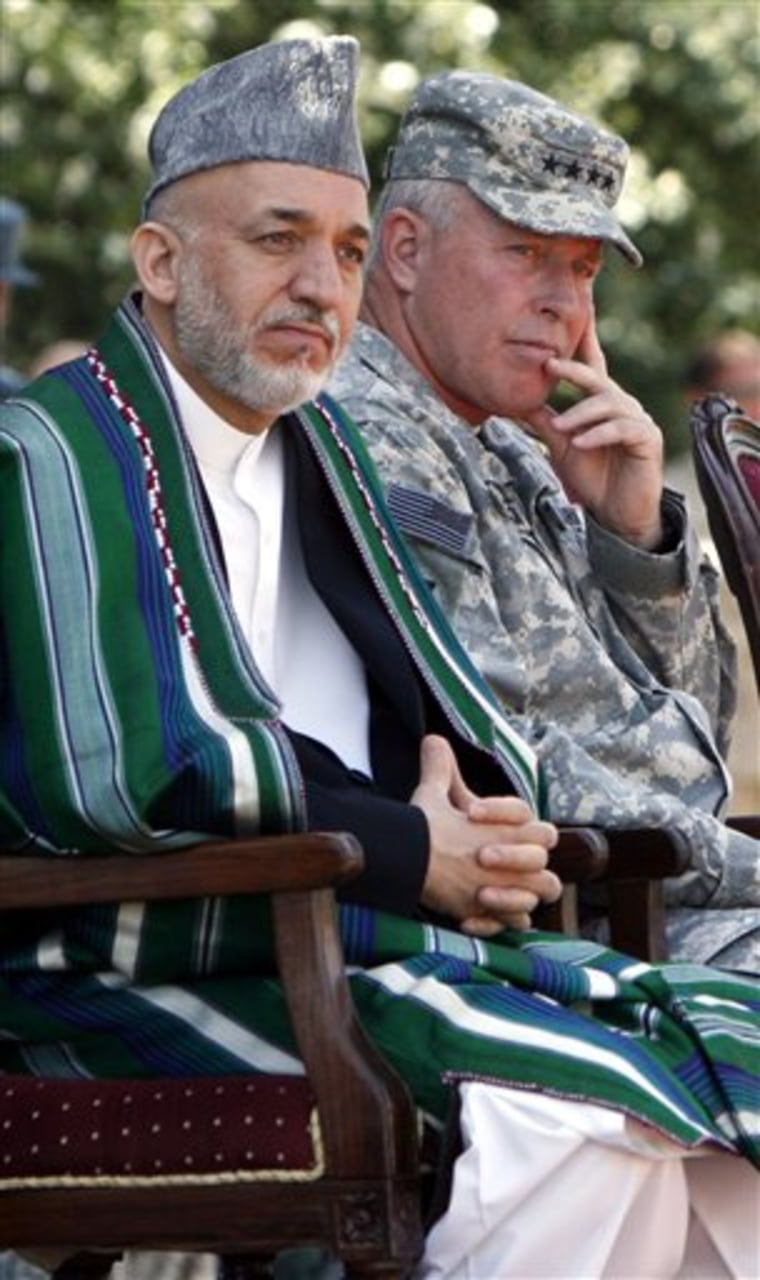Even after an extra U.S. Army brigade joins the fight against the insurgency here in January, three times that many reinforcements will be needed shortly thereafter, the highest-ranking U.S. general here said Tuesday.
Gen. David McKiernan, commander of NATO-led international forces in Afghanistan, told reporters traveling with Defense Secretary Robert Gates that the brigade arriving in January is an urgent requirement based on an assessment that fighting in eastern Afghanistan is tougher than believed six months ago.
“There are an additional three brigade combat teams” that have been validated by the Pentagon as a requirement, McKiernan said. He would not say exactly how many extra soldiers that entails, but said that it was more than 10,000 — beyond the roughly 3,700 in reinforcements that are scheduled to arrive in January.
There currently are about 33,000 U.S. troops in Afghanistan and about 146,000 in Iraq.
Gates arrived in the Afghan capital Tuesday evening after presiding at a ceremony in Baghdad where Gen. Ray Odierno took over for Gen. David Petraeus as the top U.S. commander in Iraq. Gates was meeting over dinner in Kabul with McKiernan and was to hold talks with senior Afghan officials on Wednesday.
More U.S. forces have been killed in Afghanistan so far this year than in all of 2007 as a resurgent Taliban-led insurgency has adopted bolder and often deadlier tactics. U.S. officials say the insurgency cannot win a conventional war, but its persistence has left U.S. and NATO leaders seeking reinforcements and has eroded the credibility of Afghanistan’s fragile elected government.
'Winning slower in some places'
McKiernan said he had no doubt that the insurgency could not win in Afghanistan, but he did not say U.S. forces are assured of victory, either.
“We are not losing, but we are winning slower in some places than others,” he said.
In the interview, McKiernan also disclosed that he recently issued a revised order meant to govern the tactics and procedures followed by U.S. forces when engaging in air and ground fights against the insurgents. The revision, issued Sept. 2, was in response to a series of attacks that resulted in civilian deaths — most notably the highly publicized allegations that a U.S. attack on an Afghan village compound on Aug. 22 killed as many as 90 Afghan civilians, including women and children. The U.S. military has disputed the allegation but also has launched a new investigation in light of emerging evidence.
McKiernan said 90 percent of his new directive is meant to re-emphasize existing procedures.
“We’ve put an increased focus on partnering with Afghan security forces,” he said in explaining the main change. “In other words, we want to run more and more operations that are combined operations with the Afghan army and/or the Afghan police. That’s probably a new emphasis on this tactical directive.”
Odierno takes over in Iraq
Petraeus’ next assignment will be commander of U.S. Central Command, with broader responsibilities. From his headquarters in Tampa, Fla., he will oversee U.S. military involvement throughout the Middle East, including Iraq, as well as Afghanistan, Pakistan and other Central Asian nations. He takes up that post in late October.
On Tuesday, meanwhile, Odierno became the top American commander of the conflict in Iraq. At a traditional change-of-command ceremony attended by top Iraqi and American military and civilian officials, Petraeus said that Odierno’s skills and experience make him “the perfect man for the job.”
With Gates presiding at the ceremony in a cavernous rotunda of a former Saddam Hussein palace outside Baghdad, Petraeus handed over the flag of his command, known as Multinational Force Iraq, to Odierno and then bade farewell.
Petraeus said the insurgents and militia extremists who have created such chaos in Iraq over the past five years are now weakened but not yet fully defeated. He noted that before he took the assignment in February 2007 he had described the situation as “hard but not hopeless.”
He thanked his troops for having “turned ’hard but not hopeless’ into still hard but hopeful.”
Despite the security gains, insurgents retain the ability to carry out devastating attacks. On Monday evening, a female suicide bomber blew herself up among a group of police officers northeast of Baghdad, killing at least 22 people. Hours earlier, car bombs in the capital killed 13 people.
Because of Odierno’s extensive previous experience in Iraq, he is generally expected to be able to continue building on the gains made under Petraeus’ command, although an evolving set of difficult challenges face him here and in Washington, where he will soon have a new commander in chief.
A major part of Odierno’s job will involve working with Iraqi political leaders, in tandem with U.S. Ambassador Ryan Crocker. In that role Odierno may call on his experiences in 2004-05 as assistant to the chairman of the Joint Chiefs of Staff, when he was the Pentagon’s liaison to Secretary of State Condoleezza Rice and frequently traveled abroad with her.
